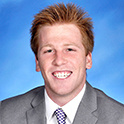
Abe Danaher
Abe Danaher is the communications assistant for the College of Information and Communications. A journalism minor in the School of Journalism and Mass Communications, Danaher is in his last semester at USC. He is from Syracuse, New York.
Posted October 8, 2018
By Abe Danaher, communications assistant
With a mind for business and research but a heart for teaching, Dr. Amir Karami will tell you that choosing the perfect career path is no easy task. Luckily, he’s found a job that allows him to tap into all of his interests — and his work is influencing how researchers are exploring big data to make even bigger discoveries.
Karami was born in the Iranian capital of Tehran during the longest war of the 20th century. Yet as a young child, he focused his attention not on the chaos around him, but on his studies. He wrote his first research article at age 9, and even as a young middle schooler, dreamed of being a professor and researcher.
But when it came time for him to go to college — and his superior score on the country’s required entrance exams got him into a top-tier Iranian university — he veered down an industry path, studying industrial engineering and information technology management.
With his undergraduate and master’s degrees in hand, Karami came to the U.S. to get his doctorate, before deciding he wanted to work for a startup company. After three years in the University of Maryland Information Systems program, he got an internship and then a job in business. But something was still missing.
“There was a concern for me,” Karami says. “I like to teach, but there is no formal teaching in industry.”
He realized, however, that there is a “startup” component to developing research projects.
“You need to hire students, manage your research team, bring new ideas and be an original, market your publications in conferences and find research investors such as NSF and NIH.”
And the field of information science, in particular, lends itself to teaching, research and business. Karami says this interdisciplinary field allows him to combine all the skills he learned in the engineering, business and information systems schools.
“I like applications more than methods,” he says. “I like to solve real-world problems utilizing already developed computational methods.”
So Karami finished his doctorate in Maryland, and then joined the School of Library and Information Science at South Carolina as an assistant professor and leading researcher in the field of information science.
Karami’s research focuses on the use of text mining in the social science, health and medical fields. He and his research team have been developing computational frameworks — in essence, data science methods that can be customized for a variety of applications and problems – to draw valuable knowledge and patterns from millions of documents without ever reading them.
He has developed research collaborations with other units at the university, including the psychology and political science departments. And thanks to a USC ASPIRE grant, which supports innovative research, he has recently put this framework to use by helping the School of Medicine understand extensive research done in the field of neurology.
“One of the most important things in science is to know what other researchers have done,” Karami says. “In this case, we need to read related papers, but reading a lot of papers is not possible for humans.”
He has also explored how scientists can put a finger on the pulse of social movements. A recent Social Sciences grant from the university allowed him to analyze a large number of tweets during the 2016 presidential election. The framework’s analysis was then used to understand the general opinions of the public leading up to the election and to investigate the behavior of social bots, including those used by Russia.
Inside the classroom, his teaching philosophy has been to have a “fun class” that encourages creativity. He prefers to cover fewer topics at a greater depth and to allow his students to acquire a deep understanding of the selected topics that he teaches through various critical-thinking exercises.
“He’s really approachable,” says biological sciences major Frank Webb, who took an honors course with Karami freshman year. Webb has been working closely with the professor on a research project for the past two years. “During the course with him I proposed a research idea and he said, ‘go for it!’”
Based on that idea — using Twitter to analyze LGBTQ health concerns — Webb has published two full papers in 2018, has earned USC Magellan Scholar and Honors College Exploration Scholar research grants, and is now working on more papers with Dr. Karami.
Through his role at USC, Karami is realizing his childhood dream — engaging in research with the potential to change the world and guiding the next generation of creative thinkers.